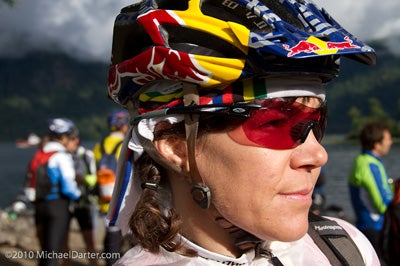
I was lucky enough to race duo with 's rock star, in Argentina's , a three-day stage race. This was our first race–and first ride–together. We ended up winning the open women's category and came in 23rd out of 350 teams. Rusch, a three-time World 24-Hour Solo champ and Leadville winner, spoke with me afterward about the race.
Besides kicking ass, how do you try to make a positive impact on women in Argentina?
I try to be friendly and supportive and cheer on any women I see riding or racing. I also host shop rides with the local Specialized dealer and invite women to come along. I let women try out my bike. I try to be as available as possible for training, nutrition, and equipment questions. I ride with the guys and keep up in order to earn a good reputation for female riders everywhere!
How was the riding in San Martin?
Much more developed than I expected. There are interconnecting trails everywhere of all types, including hand-built jumps and features. However, you kind of need a local to show you around the spiderweb. My first ride out there, I was on a dirt road heading into single track and on the same road there was a car, a man on horseback, and me on my bike. They truly share the trails here.
Is there anything in particular that makes San Martin so appealing to you?
My mom described the place as a mix between Yosemite Valley and Lake Tahoe, and that seems to sum it up. There are stunning peaks, cliffs, volcanoes and grand lakes around every turn. The scenery is the first thing I fell in love with in this area. The second thing is the zest for life that is so apparent in the way the locals approach sports, their family life, building trails, or cooking meat. They are a passionate, friendly, welcoming group of people. I have felt this vibe every single time I’ve been to this region. [Plus, there's] the world-class chocolate [and] red wine.
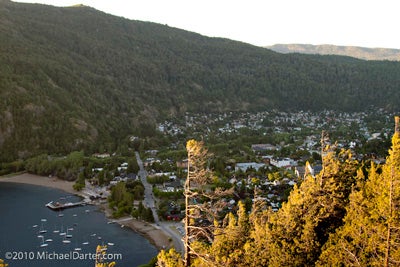
Is it hard to be away for so long, even though you travel a lot?
Sometimes travel is easier than other [times], and there are a ton of factors that can make a trip difficult. Technology has made it easier to travel for long periods of time. If I can stay connected with friends, sponsors, family and still be traveling, then I can continue to be on the road and not get behind with the other responsibilities in my life. I am not one to be tied to a Blackberry, but it does make travel easier when you can stay semi-connected. On the flip side, it will also help me stay connected to friends I meet in other parts of the world.
What was the most difficult aspect of maintaining training and nutrition in Argentina?
The fruit-and-veg store was closed on Sundays. That was hard. There were also armed guards at the grocery store, so that was an adventure. Because it’s early season for me, my training is not as super specific as it will be in a month or so. This winter trip was meant to get in miles, and I achieved that. The ten days between the two races were mostly filled with fun group rides and just a few specific hill-training sessions. The nutrition part was pretty easy there. They have good, fresh food, and I was staying in a cabin with my own kitchen, so I could cook for myself. The biggest adjustment when I first arrived was how late they eat dinner. Ten p.m. is considered early. The late nights and waiting so long to eat was hard, but by the end of the trip, I was completely acclimatized to the South American schedule.
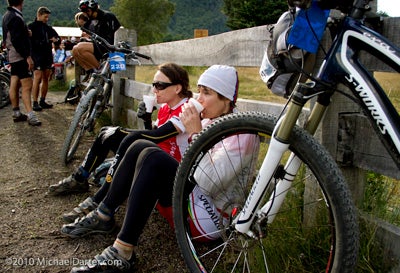
How did you eat? Who cooked for you?
For the most part, my adopted Argentine family cooked for me and welcomed me into their home at every meal. Of course, I heated water and stirred up my own little cup of Nescafe in the mornings and made a few meals on my own, but not much. There was an asado (open-fire cooked meat) about every three days–the beef there does not taste like the stuff I get at the grocery store where I live. Homemade pizza a couple of times. Homemade pasta. I ate probably a bit too well while I was there. [But] I missed having a real cup of freshly brewed coffee every day.
Which stage was your favorite?
The first stage was by far my favorite for two reasons. First, the staggered start with open men starting 20 minutes before women, mixed, and masters men really allowed for a smoother race for everyone. There was still traffic, but it was more manageable. The second reason was that it offered the most amount of single track of all the stages. Heidi, you and I absolutely excelled in these sections more than the roadie sections. It was our best finish overall that day, and I know it’s because Heidi can haul on the descents!
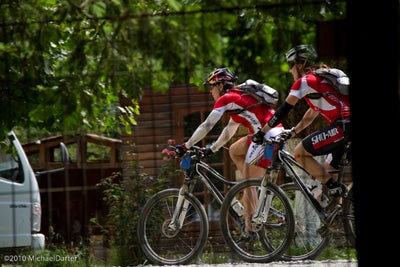
Was it difficult competing in an environment of machisimo?
If I were at home in the U.S. getting some of the macho attitude, I would be much more upset. Over there, it’s part of their culture and I am a visitor in their country. Part of international travel is experiencing differences in cultures. If every place were the same, it would get boring. South Americans are not used to being passed very often by a woman on a bicycle, so most people are excited and encouraging. Some of the male population get competitive because it’s something new. Every time I go to South America, there are more and more women riding, so I can see the change in the culture and the roles men and women play. It’s really encouraging for me to see.
Have you had unknown teammates in a foreign country besides me?
I’ve had quite a few blind dates with adventure racing, so I am used to trying to quickly get to know someone and do our best to work together for a common goal. Some people are much easier to work with than others. This time around, you were the perfect teammate, and I felt like I got really lucky. [You] were [a] hard worker, motivated, funny, prepared, and super easy to get along with. I would absolutely race with you again in a multi-day adventure, and that’s the highest compliment I can pay someone.

How do you pick someone to race with?
First and foremost, they have to be someone I want to hang out with. This is absolutely the first criteria. In all my racing, I’ve tried to follow that credo. The times where I had to choose based on other characteristics have almost all been less than positive experiences. So, #1: personality, #2: speed, #3: psyched to race with me (a.k.a. mutual respect), #4: race/travel experience, #5: similar goals and expectations for the race, and #6: the funding to go.
Did I worry you after I puked my recovery drink on day one?
Not at all because we had 18 hours until we had to race again and plenty of time for you to recover. I might have worried if you puked 30 minutes into one of the stages because recovering on the fly is way harder than recovering when still. The other reason I was not worried is that you had the maturity to tell me about it so I knew you would take your recovery seriously and do your best to be 100 percent the next day. Lastly, you didn’t have food poisoning symptoms or anything more serious, so I figured it was just a race-induced upset stomach. It was barely a blip on my radar.
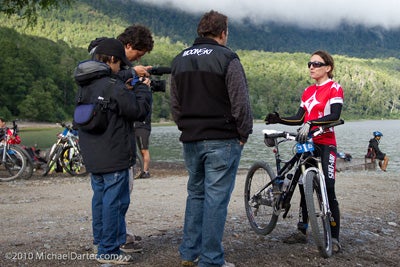
Your EMT training kicked into high gear on day two after my crash…
I’ve been an EMT with the Ketchum Fire Department for about five years. I also worked for years as a rock climbing guide and have Wilderness First Aid training from that time as well. Finally, my adventure racing experience for over 10 years has been the best wilderness medical training I’ve had, dealing with various teammates' injuries and illnesses in all sorts of situations. I actually really love emergency medical work and was really glad I was able to pull from my experience to make sure you could keep racing and stay healthy.
Was the unknown hard for you? Do you ever have any insecurities?
I had insecurities coming into the race and not knowing the field was so challenging. I have insecurities every single day and for every single race. Preparation, experience, and knowledge do much to squelch the insecurities, but they are always there waiting to bubble to the surface. The unknown nature of the competition down there, the fitness level of my teammates, my early season fitness level were all things rolling around in my head. Not knowing the race format, distances, aid station details, camping details was difficult at times. Those are key items in being prepared to race, pace yourself, and pack gear. In the end, we got all the race info we needed, but the language barrier made it more of a challenge than it would have been racing at home. However, I would not have been so elated to cross the Colorado/Utah border as I was to cross the Chile/Argentina border. The unknowns can add frustration, but they also add color.